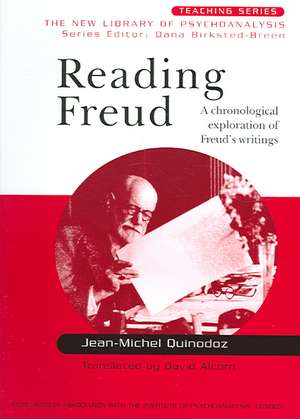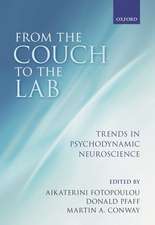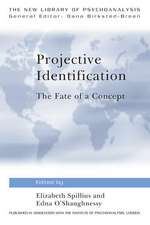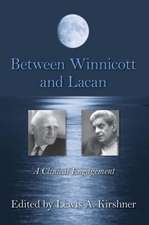Reading Freud: A Chronological Exploration of Freud's Writings: New Library of Psychoanalysis Teaching Series
Autor Jean-Michel Quinodozen Limba Engleză Paperback – 14 iul 2005
Reading Freud provides an accessible outline of the whole of Freud's work from Studies in Hysteria through to An Outline of Psycho-Analysis. It succeeds in expressing even the most complex of Freud's theories in clear and simple language whilst avoiding over-simplification.
Each chapter concentrates on an individual text and includes valuable background information, relevant biographical and historical details, descriptions of Post-Freudian developments and a chronology of Freud's concepts. By putting each text into the context of Freud's life and work as a whole, Jean-Michel Quinodoz manages to produce an overview which is chronological, correlative and interactive. Texts discussed include:
- The Interpretation of Dreams
- The 'Uncanny'
- Civilisation and its Discontents'
Drawing on his extensive experience as a clinician and a teacher of psychoanalysis, Jean-Michel Quinodoz has produced a uniquely comprehensive presentation of Freud's work which will be of great value to anyone studying Freud and Psychoanalysis.
Preț: 275.25 lei
Preț vechi: 289.74 lei
-5% Nou
Puncte Express: 413
Preț estimativ în valută:
52.68€ • 54.79$ • 43.49£
52.68€ • 54.79$ • 43.49£
Carte disponibilă
Livrare economică 24 martie-07 aprilie
Livrare express 08-14 martie pentru 34.68 lei
Preluare comenzi: 021 569.72.76
Specificații
ISBN-13: 9781583917473
ISBN-10: 1583917470
Pagini: 320
Dimensiuni: 174 x 246 x 16 mm
Greutate: 0.54 kg
Ediția:1
Editura: Taylor & Francis
Colecția Routledge
Seria New Library of Psychoanalysis Teaching Series
Locul publicării:Oxford, United Kingdom
ISBN-10: 1583917470
Pagini: 320
Dimensiuni: 174 x 246 x 16 mm
Greutate: 0.54 kg
Ediția:1
Editura: Taylor & Francis
Colecția Routledge
Seria New Library of Psychoanalysis Teaching Series
Locul publicării:Oxford, United Kingdom
Public țintă
Postgraduate, Professional, Professional Practice & Development, and UndergraduateCuprins
Part I: The Discovery of Psychoanalysis (1895-1910). Studies on Hysteria (Freud and Breuer, 1895d). Letters to Wilhelm Fliess (1887-1902]). "Project for a Scientific Psychology" (1950c [1895]). "The Neuro-Psychoses of Defence" (1894a); "On the Grounds for Detaching a Particular. Syndrome from Neurasthenia Under the Description 'Anxiety Neurosis'" (1895b); "Further Remarks on the Neuro-Psychoses of Defence" (1896b); "Sexuality in the Aetiology of the Neuroses" (1898a); "Screen Memories" (1899a). The Interpretation of Dreams (1900a); On Dreams (1901a). The Psychopathology of Everyday Life (1901b). Jokes and Their Relation to the Unconscious (1905c). Three Essays on the Theory of Sexuality (1905d). "Fragment of an Analysis of a Case of Hysteria" (Dora) (1905e]). Delusions and Dreams in Jensen’s ‘Gradiva’ (1907a). "Analysis of a Phobia in a Five-Year-Old Boy (‘Little Hans’)" (1909b). "Notes Upon a Case of Obsessional Neurosis" (The ‘Rat Man’) (1909d). Leonardo da Vinci and a Memory of his Childhood (1910c). Part II: The Years of Maturity (1911-1920). "Psycho-Analytic Notes on an Autobiographical Account of a Case of Paranoia (Dementia Paranoides)" (1911c). Papers on Technique Written Between 1904 and 1919. Totem and Taboo (1912-1913). "On Narcissism: An Introduction" (1914c). Papers on Metapsychology (1915-1917); Introductory Lectures on Psycho-Analysis (1916-17). "From the History of an Infantile Neurosis" (the "Wolf-Man") (1918b). "The ‘Uncanny’" (1919h). "A Child is Being Beaten (A Contribution to the Study of the Origin of Sexual Perversions)" (1919e). "The Psychogenesis of a Case of Female Homosexuality" (1920a). Part III: Fresh Perspectives (1920-1939). Beyond the Pleasure Principle (1920g). Group Psychology and the Analysis of the Ego (Freud 1921c). The Ego and the Id (1923b). "The Economic Problem of Masochism" (1924c). Inhibitions, Symptoms and Anxiety (1926d). The Future of an Illusion (1927c); The Question of Lay Analysis (1926e). Civilization and its Discontents (1930a); New Introductory Lectures on Psycho-Analysis (1933a [1932]). Papers on Denial of Rand Splitting of the Ego (1924-1938); An Outline of Psycho-Analysis (1940a [1938]). "Analysis Terminable and Interminable" (1937c); "Constructions in Analysis" (1937d). Moses and Monotheism (1939a). Reading Freud Today?
Notă biografică
Jean-Michel Quinodoz is a Psychoanalyst in private practice in Geneva. He is a member of the Swiss Psychoanalytical Society and Honorary Member of the British Psychoanalytical Society which are component Societies of the International Psychoanalytical Association founded by Freud in 1910. After ten years of activity as Editor for Europe of The International Journal of Psychoanalysis, he is now Editor in Chief of the New Annuals published in various languages by this journal. Jean-Michel Quinodoz is author of The Taming of Solitude and Dreams That Turn Over a Page.
Recenzii
'This book is both a primer and a resource for the specialist. It provides an accessible outline of the whole of Freud's work through analysis of key texts... the volume is an amazing editorial achievement for which readers of Freud should be most grateful.' - The Scientific and Medical Network Review
'Reading Freud is a significant contribution to the psychoanalytic literature. It is a work that reaffirms the continued value of Freudian thought in an era in which psychoanalytic ideas are under attack. It belongs on the bookshelf of both beginning candidates and experienced psychoanalysts.' - Glen Gabbard, Training Psychoanalyst of the American Psychoanalytic Association, Huston
'A unique aid to the teaching and to the studying of Freud's writing. This book is both imaginative and very instructive, particularly in placing Freud's work in context. A very ingenious colour coding helps the reader to differentiate between Freud's articles under discussion and various additional reflections and comments made from a variety of angles. A real must for anybody seriously interested in Psychoanalysis.' - Anne-Marie Sandler, Training Psychoanalyst of the British Psychoanalytical Society, London
"This book is both a primer and a resource for the specialist. It provides an accessible outline of the whole of Freud's work through analysis of key texts... the volume is an amazing editorial achievement for which readers of Freud should be most grateful." - The Scientific and Medical Network Review
"Reading Freud is a significant contribution to the psychoanalytic literature. It is a work that reaffirms the continued value of Freudian thought in an era in which psychoanalytic ideas are under attack. It belongs on the bookshelf of both beginning candidates and experienced psychoanalysts." - Glen Gabbard, Training Psychoanalyst of the American Psychoanalytic Association, Huston
"A unique aid to the teaching and to the studying of Freud's writing. This book is both imaginative and very instructive, particularly in placing Freud's work in context. A very ingenious colour coding helps the reader to differentiate between Freud's articles under discussion and various additional reflections and comments made from a variety of angles. A real must for anybody seriously interested in Psychoanalysis." - Anne-Marie Sandler, Training Psychoanalyst of the British psychoanalytical Society, London
"...this new study guide will change the way Freud is read and understood. This labor of love -- tested upon generations of analytic candidates -- is [a] significant a step forward in psychoanalytic scholarship...First of all, the reader will notice that this is deep scholarship, the deep dream-work well beneath the manifest content. Second, the organization is masterful...this is an indispensible study guide. Do not venture in the psychoanalytic institute without it." - Journal of Personality Assessment
'Reading Freud is a significant contribution to the psychoanalytic literature. It is a work that reaffirms the continued value of Freudian thought in an era in which psychoanalytic ideas are under attack. It belongs on the bookshelf of both beginning candidates and experienced psychoanalysts.' - Glen Gabbard, Training Psychoanalyst of the American Psychoanalytic Association, Huston
'A unique aid to the teaching and to the studying of Freud's writing. This book is both imaginative and very instructive, particularly in placing Freud's work in context. A very ingenious colour coding helps the reader to differentiate between Freud's articles under discussion and various additional reflections and comments made from a variety of angles. A real must for anybody seriously interested in Psychoanalysis.' - Anne-Marie Sandler, Training Psychoanalyst of the British Psychoanalytical Society, London
"This book is both a primer and a resource for the specialist. It provides an accessible outline of the whole of Freud's work through analysis of key texts... the volume is an amazing editorial achievement for which readers of Freud should be most grateful." - The Scientific and Medical Network Review
"Reading Freud is a significant contribution to the psychoanalytic literature. It is a work that reaffirms the continued value of Freudian thought in an era in which psychoanalytic ideas are under attack. It belongs on the bookshelf of both beginning candidates and experienced psychoanalysts." - Glen Gabbard, Training Psychoanalyst of the American Psychoanalytic Association, Huston
"A unique aid to the teaching and to the studying of Freud's writing. This book is both imaginative and very instructive, particularly in placing Freud's work in context. A very ingenious colour coding helps the reader to differentiate between Freud's articles under discussion and various additional reflections and comments made from a variety of angles. A real must for anybody seriously interested in Psychoanalysis." - Anne-Marie Sandler, Training Psychoanalyst of the British psychoanalytical Society, London
"...this new study guide will change the way Freud is read and understood. This labor of love -- tested upon generations of analytic candidates -- is [a] significant a step forward in psychoanalytic scholarship...First of all, the reader will notice that this is deep scholarship, the deep dream-work well beneath the manifest content. Second, the organization is masterful...this is an indispensible study guide. Do not venture in the psychoanalytic institute without it." - Journal of Personality Assessment
Descriere
Winner of the 2010 Sigourney Award!
Reading Freud provides an accessible outline of the whole of Freud's work, which succeeds in expressing even the most complex of Freud's theories in clear and simple language whilst avoiding over-simplification.
Reading Freud provides an accessible outline of the whole of Freud's work, which succeeds in expressing even the most complex of Freud's theories in clear and simple language whilst avoiding over-simplification.



















